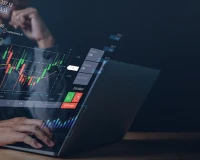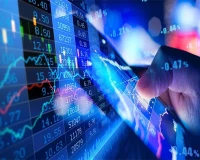-Introduction:
The world of forex is considered a volatile and complex environment, but beginners can achieve financial success smartly when they dedicate time to understanding the basics and adopting effective strategies. In this context, we will highlight some key points that beginners should pay attention to. This dynamic market showcases the complexity of international financial relations and provides investors with opportunities to profit from the daily fluctuations in currency values
-Understanding the Basics:
At the beginning, new traders must understand the fundamentals of the currency market. This includes understanding the concepts of supply and demand and how currency values are determined. They should be able to analyze currency pairs and understand how economic events affect exchange rates. The forex market, or foreign exchange market, represents one of the largest trading markets in the world and is an exciting place where investors meet to profit from movements in international currencies. In this context, understanding the basics in forex is a key tool for beginners, as it paves the way for a deeper understanding of this complex world
-Choosing a Broker Carefully:
Choosing a reliable broker is crucial. Beginners should check the broker's licenses, ensure their reputation, and understand the fees involved in trading. The right broker can significantly impact the trading experience.
Steps to Test the Broker:
Research and Read Reviews: Read reviews and opinions from previous traders about the broker to gain a better understanding of their track record and services.
Use a Demo Account: Test the trading platform using a demo account to experience the broker’s conditions in a risk-free environment.
Check Regulation: Verify the broker's licensing and the regulatory bodies they are subject to, ensuring their credibility.
Develop an Investment Plan: Creating an investment plan in the forex market is a crucial step towards success and achieving sustainable profits. This plan serves as a guide for the trader throughout the trading process and helps define goals and manage risks.
Set Goals: Before starting any trades, the investor should clearly define their goals. Are they aiming for short-term profits or long-term investment?
Choose Financial Instruments: The investor should select currencies and financial instruments that align with their strategy and goals, while considering portfolio diversification.
Develop a Trading Strategy: The investor needs to create a trading strategy based on technical and fundamental analysis. Identifying currency pairs and entry points.
Time Management: The appropriate trading periods should be determined, and a daily schedule for analysis and decision-making should be set.
Monitor and Evaluate: Periodically, the investor should monitor the performance of their strategy and make necessary adjustments based on analysis and evaluation.
Continuous Learning: Continuous learning is an essential part of the investment plan. Keeping up with market developments and updating the strategy based on experiences and lessons learned.
Provide Financial Reserves: A portion of the capital should be kept as a financial reserve to withstand tough periods and avoid the risk of losing all capital

-Risk Management:
In the forex market, traders must understand the importance of managing risks carefully. Achieving success in this volatile market heavily depends on the ability to control potential risks and reduce exposure to losses. To manage risks effectively, a trader must be fully aware of the concept of risk and how to classify it in the context of trading. Risks can be identified by examining trading opportunities and estimating the likelihood of market changes
-Determining Position Size:
Determining the appropriate position size is an essential part of risk management. It is recommended not to exceed a certain percentage of the capital for each trade, and this percentage depends on the level of risk the trader is willing to take
-Using Stop-Loss Orders:
A stop-loss order is an effective tool to protect the investment, as it allows the trader to set a predetermined acceptable loss level. This order should be used cautiously to minimize significant losses in case of unexpected market changes
-Demo Trading:
The concept of demo trading in the forex market represents a great opportunity for beginner traders to develop their skills and gain confidence before entering the real trading world. Demo trading serves as a vital gateway to understanding market fundamentals and testing trading strategies without exposing oneself to actual financial risks.
-Getting to Know the Trading Platform:
Demo trading allows traders to familiarize themselves with the trading platform and understand its functions and tools. Beginners can test order execution and explore the user interface without the fear of losing real money.
-Understanding Market Dynamics:
Through demo trading, traders can understand how price movements and the market respond to economic and political events. They can analyze charts and use technical indicators without the actual financial impact.
-Testing Trading Strategies:
Demo trading offers the chance to test and apply various trading strategies. Traders can refine their style and choose the strategy that suits their objectives and personal trading style

-Developing Risk Management Skills:
Through risk-free trading, traders can learn how to manage risks effectively. They can accurately set stop-loss and take-profit levels and understand their impact on account management.
-Building Confidence:
Demo trading helps traders build confidence in their trading decisions. Experiencing both successes and failures within a risk-free environment enhances confidence before transitioning to real trading.
-Identifying Strengths and Weaknesses:
By monitoring their demo trading performance, traders can identify their strengths and weaknesses. They can adjust their strategies and improve their performance based on self-analysis.
-Preparing for Real Trading:
After experiencing success and ensuring their readiness, traders can move to real trading with greater confidence and a deeper understanding of the risks and opportunities in the forex market
-Follow the News and Events:
In the forex market, where everything changes rapidly, the importance of following news and events is a fundamental pillar for trading success. The impact of economic and political news on price movements can be huge, and successful trading largely depends on understanding these events and responding with caution and effectiveness.
Understanding the Impact of News on the Market:
Economic and political news can significantly affect currency values. For example, GDP reports and interest rate changes can lead to sharp fluctuations in exchange rates.
Global events, such as economic crises or political conflicts, have the ability to create massive volatility in the markets, requiring traders to monitor developments continuously.
The Importance of Timing:
It is crucial to know when news will be released and ensure that traders are prepared to respond quickly to the market's fast reactions.
Preparing for Volatility:
Anticipating volatility and developing a trading strategy to handle rapid market movements is essential.
Analyzing Market Reactions:
Monitoring how the market reacts to news helps traders understand trends and make sound decisions.
Avoiding Random Trading:
Focusing on important news and avoiding random trading helps protect traders from unnecessary risks.
Continuous Learning:
Successful trading requires continuous learning and staying updated on market developments







